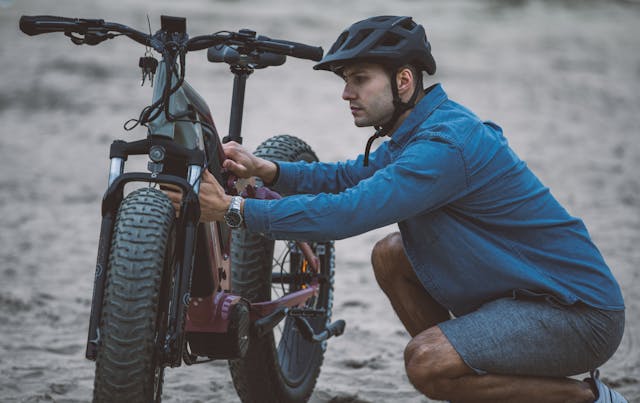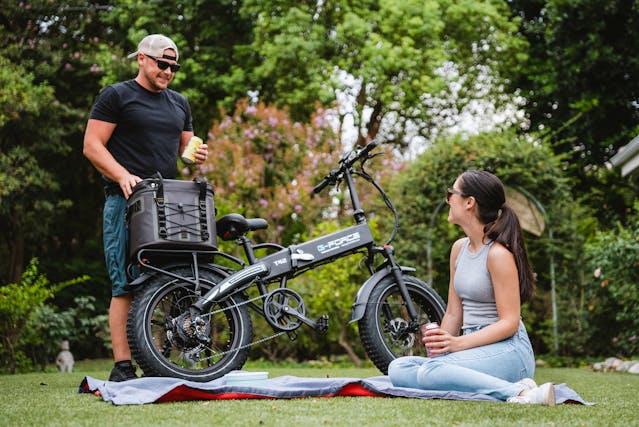In the sprawling expanse of the Prairie State, a deep-seated grasp of ebike’s legal status is imperative. It serves as a compass for riders to chart their way through the urban jungle and across varied trails within Illinois’ bounds, all while being on the right side of the law and safeguarding their well-being. The legislators in Illinois have meticulously crafted laws that act as guiding lights so that this cutting-edge mode of commuting fits into certain norms, thereby enhancing rider safety and mitigating potential clashes with conventional vehicular movement and foot traffic.
The labyrinthine web of Illinois ebike laws provides an intricate legal skeleton which tackles diverse facets associated with electric bike use. This includes setting speed boundaries, stipulating safety gear prerequisites, including usage limitations among other things.
In these complex edicts from Illinois governing ebikes, they are sorted into three distinct categories: Class 1, Class 2, and Class 3. The basis for such classification hinges largely upon factors like maximum achievable speed along with how such speeds are attained – via pedal assistance or an electric motor propelling it forward? Each class carries its own unique set of regulations which directly shape how these bikes can be ridden – where they may tread paths untreaded by others before them; who would be deemed fit to ride them?
These rules aren’t consistent replicas mirroring those imposed on traditional bicycles or motorized vehicles; instead they echo an understanding towards distinctive attributes possessed by ebikes.
Deciphering the Role of Pedaling in Ebike Regulations
The intricate web of e-bike regulations, by and large, pivot on the mechanics of the pedal-assist system. To demystify a common query – is there street legality for e-bikes in Illinois? The response leans heavily on how the initiation process of an e-bike unfolds. The official edict from Illinois insists that for an e-bike to gain legal status on streets, it must be fitted with a setup insisting upon pedal action to kickstart the motor; this stands in contrast with those versions where motor function exists independently from pedaling.
Curiously enough, this mandate isn’t just whimsical lawmaking. In Illinois’s context, pedaling’s role within ebike laws plays a pivotal part in classifying bikes and setting usage limitations. This rule stems from an intention to keep ebikes under conventional cycling parameters while encouraging physical exertion among riders. Henceforth, if an e-bike has a motor capable of providing propulsion without any need for rider effort via pedals technically tiptoes outside legal boundaries.”
Interpreting Speed Restrictions for Ebikes

The labyrinthine task of understanding the laws surrounding electronic bikes can indeed be intimidating for ebike enthusiasts, especially when it comes to deciphering speed restrictions. The rules governing ebikes in Illinois, officially recognized as Electronic Personal Assistive Mobility Devices (EPAMDs), don’t explicitly lay down a top speed limit.
These modern transport marvels are nonetheless required to conform to safety regulations and standard road and bike path speeds. This subtly implies that biking at extreme speeds may invite punitive actions from law enforcement agencies.
A pivotal query often posed while determining the legally safe speed is: how does one go about registering an e-bike in Illinois? Interestingly, during registration, there’s no need to declare its maximum speed – hinting towards the lack of a strict cap on ebike velocities. However, it’s important to underscore that adopting a pragmatic approach by aligning one’s ebike speeds with prevailing traffic conditions is vital for ensuring safety.
Therefore, despite appearing relatively lax concerning speed limitations imposed on e-bikes by the Illinois legislation, each rider should exercise judicious judgement while manoeuvring their vehicles on roadways. It is essential for them to understand that responsible biking forms an indispensable part of not just their own but also others’ safety around them.
The Necessity of Helmets and Safety Gear for Ebike Riders
Under the governance of the Illinois Department of Transportation, safety regulations must be strictly adhered to by all electric bike riders, irrespective of their vehicle category. Emphasizing particularly on Class 3 Electric Bike operators, a strong plea is made for the understanding and recognition of helmet and safety gear importance. The laws governing Class 3 Electric Bikes in Illinois explicitly urge users to display an attentive concern towards their own wellbeing as well as that of others sharing the road space. This means mandatory donning helmets and suitable safety equipment given these bikes’ ability to reach impressive speed ranges.
The crux here lies within the main objective behind these laws – preventing or at least minimizing severity and frequency of injuries resulting from unfortunate mishaps. Helmet use dramatically decreases chances for head or brain damage during accidents while high visibility attire, apt shoes, and defensive gear noticeably lower injury risk across diverse accident scenarios. Thus, embedding this essential comprehension coupled with constant reinforcement about safety precautions boosts chances for more secure riding practices.
Exploring the Age Limit for Ebike Users in the Land of Lincoln
Perplexed individuals in the Prairie State, also known as Illinois, may at times find themselves pondering over the question – “Is a license required for an 80cc bike?” The answer to this query is simple yet unequivocal. It lies within the boundaries of affirmation. In accordance with the legislation laid out by Illinois state law, it is mandatory for all vehicles powered by an internal combustion engine exceeding 50cc (an inclusion that certainly encompasses an 80cc bike) to be in possession of a valid title and registration. Thus, any individual harbouring intentions of manoeuvring an 80cc bike must ensure they hold a legitimate driver’s license complemented by a motorcycle endorsement.
Plunging into further details surrounding age restrictions associated with Ebike usage, there are legal stipulations set down by Illinois which dictate that one should have reached the milestone age of sixteen before operating an Ebike. Yet another significant point worthy of attention is aimed at prospective riders who are below eighteen years-old; these young enthusiasts are required to complete a driver education course sanctioned and approved by the state itself.
Moreover, regardless of their age bracket or status quo in life, it remains highly recommended for all riders to undertake completion of a motorcycle safety course sponsored officially by our state authorities. This particular initiative ensures each individual rider acquires necessary skills designed not just for basic operation but more importantly for safe navigation through the bustling streets typical throughout Illinois.
The Implications of DUI Laws on Ebike Riders
A conundrum that ebike riders often grapple with revolves around the ramifications of Driving Under Influence (DUI) Laws. In the state of Illinois, these DUI laws which are aimed at motor vehicle operators also cast a shadow on those steering ebikes. Although ebikes escape classification as motor vehicles, intoxicated navigation could nonetheless invite DUI indictments.
An oft-repeated inquiry posed to ebike riders is – “Is it permissible in Illinois to ride a bike on the sidewalk?” The response within Illinois law remains shrouded in ambiguity. Within jurisdictions where bicycles can tread on sidewalks without breaking any rule, those manipulating an ebike must strictly abide by DUI regulations. For public streets and highways, there’s no vagueness in the law stating its prohibition for anyone operating a bicycle while under alcohol or drug influence. Transgression against this mandate could pave way for stiff penalties.
The Use of Ebikes on Public Paths and Trails
In the realm of Chicago’s prevailing e-bike rules, it becomes essential to grasp the stipulations bound with using these electric machines on public walkways and trails. The regulations have been meticulously crafted to assure a secure and peaceful cohabitation between those who ride ebikes and pedestrians sharing these pathways. Prior to embarking on an e-bike journey, having a thorough comprehension of these laws can prevent unintended transgressions while fostering safer biking habits.
Beyond mere traffic signals and road signage, Chicago’s e-bike regulations lay down explicit directions for bike lanes as well as shared paths. They require riders to uphold a speed limit that is attuned with pedestrian safety along with others making use of this shared space. Moreover, disregarding these rules while navigating such routes not only jeopardizes all participants but also invites potential sanctions. Thus, it becomes incumbent upon e-bikers to persistently exercise caution, respect fellow path users, and abide by these directives in order to nurture and maintain a safe environment for one and all.
FAQs
In the “Decoding Ebike’s Legal Classification in Prairie State” segment, you’ll find a comprehensive discussion on this topic.
The section named “Unraveling Pedaling’s Role in Ebike Regulations” dives deep into this particular aspect.
For an exhaustive insight into speed limitations pertaining to ebikes, refer to our chapter titled “Demystifying Speed Restrictions for Ebikes”.
Our discourse titled “Helmet & Safety Gear – A Necessity For Ebike Riders?” examines this concern thoroughly.
The portion labeled as “Delving into Age Limitations For Ebikers In The Land Of Lincoln” will enlighten you about this matter.
You can browse through our material named “DUI Laws And Their Impact On E-bikers” to understand its implications better.
If you’re keen on learning about eBiking rules on public grounds, check out our section called ‘Navigating Through Rules Regarding Public Pathway Usage By EBikers’.
